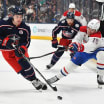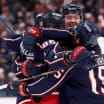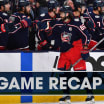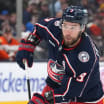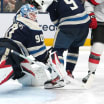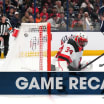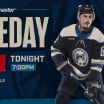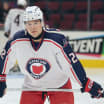There's a certain spot in the Blue Jackets dressing room -- the deeper you go, in fact, from the main entrance -- where you never know what you might hear.
On a given day, Joonas Korpisalo might be speaking Finnish with Markus Nutivaara. Pierre-Luc Dubois, Alexandre Texier and David Savard could be chatting in French. And Vladislav Gavrikov and Elvis Merzlikins might be teaching Dubois a new Russian word or two.
In fact, if there's something Dubois might be most proud of at the moment, it's his ability to hold a conversation in Russian with his teammates.
Different languages bring Blue Jackets players together
Columbus players come from all over the world and have the words to prove it
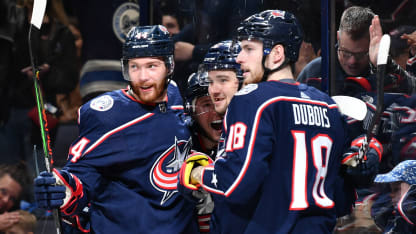
© Jamie Sabau
"I'm the third best Russian (speaker) on this team -- by far, too," said Dubois, who said he's up to more than 60 words in his repertoire. "Guys are skeptical, but ask the real guys that speak Russian and they'll tell you by far that I'm the third best on the team."
A quick check in with Merzlikins confirms Dubois' side of the story.
"We are teaching him some words," the goaltender said. "The mission is that by the end of the season, we can fluently talk to him and he can understand. He's actually doing really good. I'm pretty impressed. Obviously he's not going to have the accent, but you can understand what he's saying and what he wants, so that's good."
In a locker room that is among the most unique in the league when it comes to its multicultural roots -- on opening night, the Blue Jackets had players from nine nations on the roster, tied for the most in the NHL, and the addition of Slovakian Marko Dano earlier this season means players from 10 nations have played for the team - the different languages spoken have the ability to bring the Blue Jackets together.
"I think it's awesome," defenseman Ryan Murray said. "When the summer comes and everyone starts going back home, you don't really realize when you're here how these guys are from so many different places all over the planet. I think it's really cool how many guys are from other places. I look around and everyone seems to be from a different country."
The Kings of Languages
Dubois grew up in an interesting world. His father, Eric, hails from Quebec, but met Dubois' mother, Jill, when he was living in Atlanta playing professional hockey. Pierre-Luc mostly grew up in the suburbs of Montreal but spoke both English and French growing up, so he's fluent in each.
But that's not all. Though he's since forgotten much of the language, Dubois also learned German when he was a kid because his father spent parts of three seasons playing in that country's top league.
Perhaps given his youth as a globetrotter, Dubois has a fascination with learning the languages others are speaking.
"I love languages," he said. "When I was a kid, when I was 3, I spoke German. I lost it all, so it's a little frustrating. But I think I pick up languages fast, too. I went on (language app) Duolingo and learned German on that. I took it for a month or two, and I was on there maybe once every two or three days, and I actually know a lot of German words so it was coming back really fast."
His interest in learning Russian started when he was in juniors and played with two players from the country, Evgeni Svechnikov and Maxim Lazarev. It also came in handy over the past two years when he became a linemate with Artemi Panarin.
Dubois' hope is to keep going from there -- perhaps with a little help from his friends.
"I want to learn another language," he said. "I've been telling guys for the two years I've been here, guys like Korpi, Bjorky, guys like that, we should take a class together, like two to six guys together. If we're doing it together, we can help each other out and motivate each other, but nobody is on board with me. If I do it alone, you know how it is -- if you don't talk it, what's the point?
"We can learn Spanish, German, Russian, Swedish. Finnish is too hard. Danish is too hard. Russian, Spanish or German are the three that we talked about, but I just have to get the guys on board."
If Dubois keeps adding to his repertoire, he can join the king of languages in the Blue Jackets locker room -- pun intended.
Merzlikins can fluently speak four languages and wants to add another. Merzlikins is a native of Riga, Latvia, so most of his family speaks Latvian, while his late father was Russian, so Merzlikins speaks that language, too. He can also speak English -- it's something he learned after becoming a pro in 2014 -- as well as Italian, which was necessary given he spent most of his life living in Lugano, Switzerland.
Yes, he needed to know Italian in Switzerland. Lugano is located on a peninsula in southern Switzerland that juts into Italy, and Italian is the local tongue there.
Next up, he hopes to add Spanish as a fifth language.
"I really like the language, how it sounds," Merzlikins said. "I know Italian, so people are saying it should be easy to learn it. I like languages, so it's good. I like to study them. I don't know why; I just like it."
There are days now, though, when Merzlikins will speak in all four tongues that he currently has in his repertoire. He speaks Latvian when he calls his family at home, Russian with Gavrikov and Dubois, English with most people in the United States and Italian with his girlfriend, Aleksandra.
"Sometimes you get confused," he admitted. "Maybe it happens that some words I say to Vlad, and I'm like 'Oh (crap), that's not the language.' Speaking four languages every day is hard."
Even if Merzlikins does screw up occasionally while chatting with Gavrikov, it's fair to say the Russian defenseman is impressed.
"Oh my god, he's a smart guy," Gavrikov said. "He's a goalie, but he's a smart guy."
From Lesser Known Parts
On a different side of the equation are such players as Dean Kukan and Oliver Bjorkstrand. Kukan hails from Switzerland and speaks Swiss German, a dialect of the German language spoken in his part of his native country, while Bjorkstrand grew up in Denmark speaking Danish.
No one else in the locker room hails from those respective countries, so if Bjorkstrand or Kukan want to speak those native tongues, they have to do so by calling home.
Bjorkstrand's father, Todd, actually hails from Minnesota but has made a living playing and coaching in Denmark. Growing up in Herning, Denmark, Bjorkstrand said he learned both English and Danish as a kid, though he was stubborn and wouldn't speak the former until he was 5 years old. Now, he's based in the U.S., even spending offseasons here, but wants to stay fluent in his native tongue.
"I don't want to forget it," he said of Danish. "I am rusty. I'm here a lot. I need to pick up a few Danish books just to keep me going. Hopefully I'll never forget Danish."
Kukan, meanwhile, hails from a country with a bit of an identity crisis when it comes to languages. Three main languages are spoken in Switzerland, with the majority of the country speaking a German dialect, but about a quarter of the nation speaking French and about 10 percent in the southern part of the country -- like Lugano -- speaking Italian.
His hometown of Volketswil is in the Swiss German-speaking part, but he also grew up learning English and French as mandatory languages in school. He can speak a little Swedish because his wife is from there -- Kukan played in Sweden for four seasons before coming to the U.S. -- but Swiss German is his natural language.
"I speak Swiss German at home," he said. "It's what we speak with friends and family. It's kind of the same as German. It counts as the same language, almost. Swiss German is basically like a slang German, if you want to say it like that."
A Common Language
It is interesting to see how where a person grows up impacts the languages they are taught.
In both the United States and Canada -- except Quebec, where the populace speaks French as its first language -- most children learn English and then are introduced to another language in secondary school, but there's no guarantee how much that language will stick once they leave school.
In much of Europe, English is taught as a second language to whatever a person may speak in their native land, but it's not a hard and fast rule. In Sweden and Finland, for example, players said they know their own language from birth, learn English in school as well, and might be taught a little bit of the opposite language -- Swedish in Finland, or Finnish in Sweden -- but not enough to speak it fluently by the time they come to the NHL.
(Finnish, in particular, seems to be a difficult language to pick up. "Try it," Bjorkstrand said. "I don't even know if it's a language. I think it's a cool language, but it's hard.")
While the French often stick to their language guns and the Russians do as well -- though Gavrikov did learn some English and French in school, then brushed up on the former with his wife before he joined the Blue Jackets -- English remains, perhaps ironically, the lingua franca of the game.
The game has Canadian roots and has been a pro sport in America for nearly a century, after all, while many of the players who come from overseas also have enough of the language in their arsenal that it makes sense for everyone to stick with English on the ice.
But for someone like Texier, who grew up speaking only French in his hometown of Grenoble near the Alps, it was a bit of an adjustment -- so much so that when he moved to Finland to continue his career after being drafted, he was instructed not to learn the local language but English instead.
"You have to," said Texier, who arrived at age 18 to play for KalPa in Kuopio, Finalnd. "The first time I talked to my coach, Sami Kapanen, he was like, 'If you want to be in the NHL, you have to learn English.' That was the only thing he told me at first because I didn't speak English.
"It was pretty hard to be in the locker room being a new guy not speaking English. They don't know who you are. You're French. They're like, 'Are you a soccer player or something?'"
While English is the day-to-day tongue of the hockey world, some players will make the switch to their native language as soon as they leave the ice, while others are more than happy to speak their home language when paired on the ice with players from their home country. For example, former Djurgardens teammates Emil Bemstrom and Jakob Lilja could speak Swedish together on the ice when they started the year as linemates, leading to a memorable quip from their center, Riley Nash.
"I already know the cuss words, so I'm one step of the way there," Nash said. "I just need to know when they're telling me to get them the puck. If it's anything associated with the cuss words, then it's not a good thing."
Others, like Dubois, are always looking to learn more. But each has an appreciation for the different places and experiences their teammates share.
"I love languages," Dubois said. "I hate not understanding what people say saying, too. If the Russians are talking to each other, I'm not saying I don't want them to, but me sitting here, I'm like, 'I wish I could understand them. It would be fun to be able to talk to them.'"


